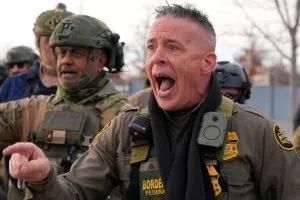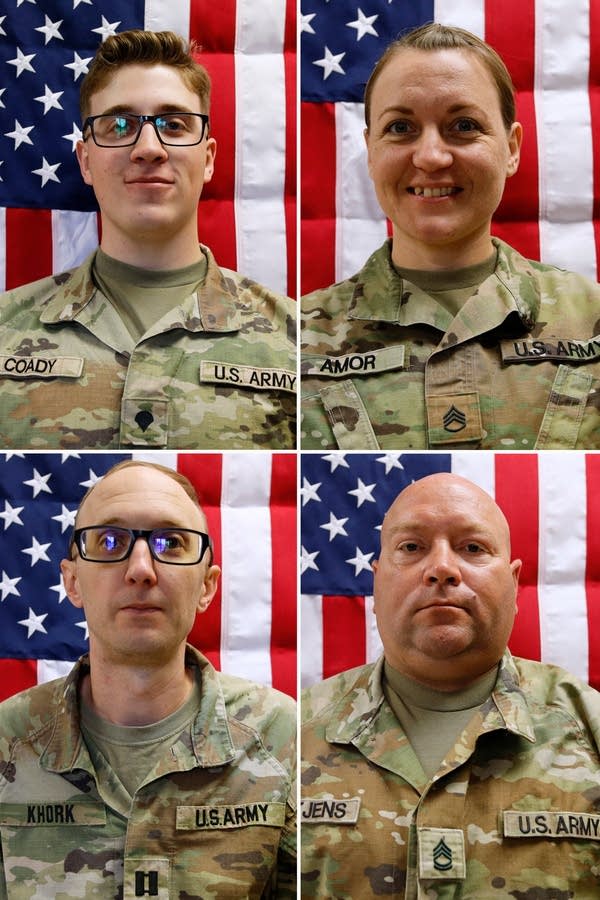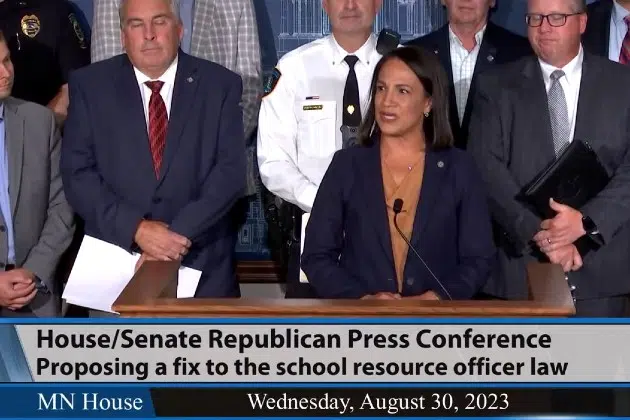(KNSI) — St. Cloud is among the growing list of law enforcement agencies either in a holding pattern waiting for clarification or placing School Resource Officer programs on hold in response to the recent amendments to statewide school discipline laws.
The law prohibits officers from placing students in the prone position or using “comprehensive restraint on the head, neck and across most of the torso.” The Minnesota Chiefs of Police Association sent a letter to Governor Tim Walz saying the measure prevents officers from using common tools used to break up physical altercations.
When asked, Governor Tim Walz said he thinks we should agree, “we should not be on the necks of students unless someone’s life is at risk, and that was written in the law to be able to do that.”
Keith Ellison was asked by Minnesota Department of Education Commissioner Willie Jett to clarify the language. Ellison’s opinion says the amendments do not limit the types of force that school employees and agents may use to prevent bodily harm or death but retain the instruction that force must be “reasonable” in those situations.
What is “reasonable” is up to interpretation, and agencies say it is still far too ambiguous.
Hennepin County Sheriff Dewanna Witt issued a statement, saying the SRO in the Rockford School District won’t return this year because of the “ambiguous limitations” imposed on officers. She added the law is “incompatible with sworn duties of a licensed peace officer,” and in an ideal world, there would be no need for cops in schools, “but when the need to respond to a serious incident arises, they need to know that they will not be held liable for appropriately filling that duty.”
Witt has pulled SROs from other Hennepin County schools and instead is having officers patrol near the schools.
House Minority Leader Lisa Demuth (R — Cold Spring) held a press conference Wednesday morning. She and other lawmakers are asking the governor to call a special session to deal with the issue. “We cannot have our schools, our students, our staff waiting for six more months to figure out something that we already know is an issue.”
Governor Walz said he is open to discussing changes but will not entertain the idea of a special session to do it, meaning if there are any changes made, it won’t be until at least February after the Legislature reconvenes.
Demuth says school safety must be a top priority. “This is about allowing our school resource officers to use the de-escalation tools that they are trained in, because we know that we all in Minnesota want schools that are safe and successful for all of our students.”
One example given was when two kids start to argue in a hallway, and the conversation turns heated. Before long, a crowd gathers, and cellphones come out as the group chants, ‘ fight, fight.’ The two students start pushing, and eventually, it comes to throwing punches. Law enforcement asks, at what point is there a threat of harm? Is it when students start to argue? Is it when people are chanting? Or is it when they start pushing and throwing punches?
Blaine Police Chief Brian Podany says that puts officers and administration in a tough spot. “It’s hard enough for educators and our peace officers to manage, at times, chaotic, violent and unusual situations involving our children and their safety. Having to navigate the legal confusion surrounding that in a split second sets everyone involved in that situation up for failure.”
Podany says the way it was, staff members or school resource officers would interject themselves, push through the crowd, and take the students to the office. “You can’t physically intervene now, until it’s potentially too late. And if you don’t intervene soon enough, as a police officer, you could be liable. But if you intervene too soon, you could be liable under this statute. It creates a no win situation for law enforcement.”
He says officers can rely on their training in those situations, just like teachers rely on theirs in the classrooms. “The SRO comes with the skill set and tools as a licensed peace officer the educators do not have. I’m not going to tell the teacher how to teach algebra. I’m going to count on them to have their skill sets and tools and to teach algebra. Our SROs have to be counted on for their skill sets and tools as well, particularly in times of crisis.”
Podany said the Blaine Police Department has ended all SRO contracts and argued the new law won’t make students and staff safer. “We’re all backing out and saying, wait a minute, how can we expect our staff to go to the school and work there every day when they’re constantly worried about being sued, or whatever it may be, instead of just focusing on their job, and developing those relationships and maintaining that safety in the school.”
The BPD is putting together a workaround by stationing officers near schools so they can respond quickly and would have officers conduct random building walkthroughs.
Locally, St. Cloud police have not pulled the plug on any SRO programs. They are hoping for a legislative fix. In Stearns County, the sheriff’s department provides SROs in the Holdingford, Kimball, and Melrose districts. Classes have already begun in Kimball with the SROs in place. When school starts next week in the other districts, the officers will be there. Officials say they share the same concerns, but after much discussion on the topic, the decision was made to keep the SRO program in place.
School districts and police departments who have put their program on hold or suspended as of Wednesday include:
Andover
Anoka
Blaine
Champlin
Coon Rapids
Clay County
Dilworth-Glyndon-Felton
Hennepin County
Moorhead
Redwood Falls
St. Louis County
Ulen-Hitterdal
___
Copyright 2023 Leighton Enterprises, Inc. All rights reserved. This material may not be broadcast, published, redistributed, or rewritten, in any way without consent.










